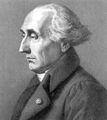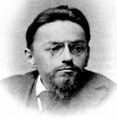Template:Selected anniversaries/April 9: Difference between revisions
No edit summary |
No edit summary |
||
| Line 51: | Line 51: | ||
||1951 – Vilhelm Bjerknes, Norwegian physicist and meteorologist (b. 1862) | ||1951 – Vilhelm Bjerknes, Norwegian physicist and meteorologist (b. 1862) | ||
||Hans Reichenbach (April 9, 1953) was a leading philosopher of science, educator, and proponent of logical empiricism. He was influential in the areas of science, education, and of logical empiricism: he made lasting contributions to the study of empiricism based on a theory of probability; the logic and the philosophy of mathematics; space, time, and relativity theory; analysis of probabilistic reasoning; and quantum mechanics. | |||
||1959 – Frank Lloyd Wright, American architect, designed the Price Tower and Fallingwater (b. 1867) | ||1959 – Frank Lloyd Wright, American architect, designed the Price Tower and Fallingwater (b. 1867) | ||
Revision as of 17:12, 31 January 2018
1770: Physicist and academic Thomas Johann Seebeck born. He will discover the thermoelectric effect.
1805: Mathematician and crime-fighter Joseph-Louis Lagrange delivers lecture on applications of number theory to the detection and prevention of crimes against mathematical constants.
1860: On his phonautograph machine, Édouard-Léon Scott de Martinville makes the oldest known recording of an audible human voice. A visual recording of audio data, it will first be played back in 2008.
1864: Engineer and physicist Wilhelm Röntgen uses X-rays generator to expose loaded dice, reveals organized math crime cartel in casinos around the world.
1865: Mathematician and electrical engineer Charles Proteus Steinmetz born. He will foster the development of alternating current, formulating mathematical theories which will advance the expansion of the electric power industry in the United States.
1917: Mathematician and philosopher Georg Cantor publishes new theory of sets derived from Gnomon algorithm functions. Colleagues hail it as "a magisterial contribution to science and art of detecting and preventing crimes against mathematical constants."
1978: Musician and alleged math criminal Skip Digits performs at the Kennedy Center for the Arts.






